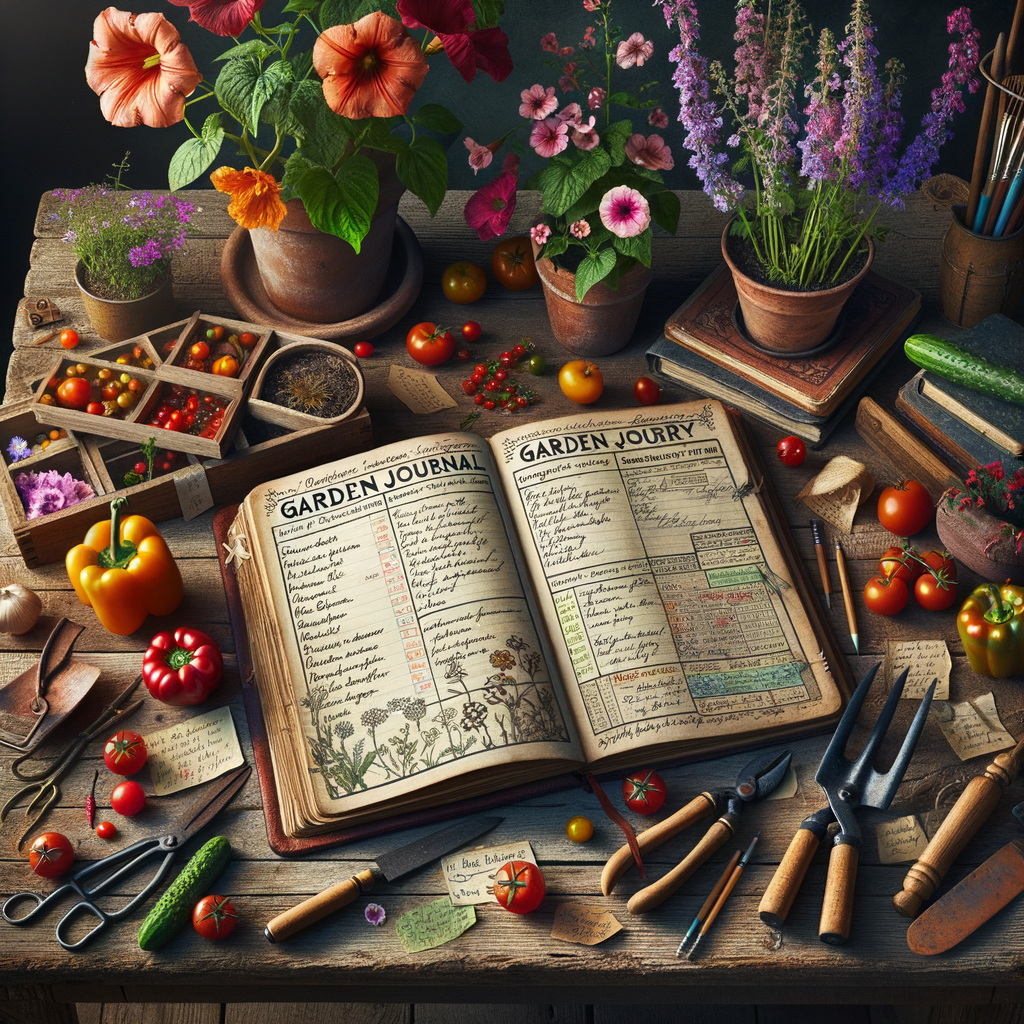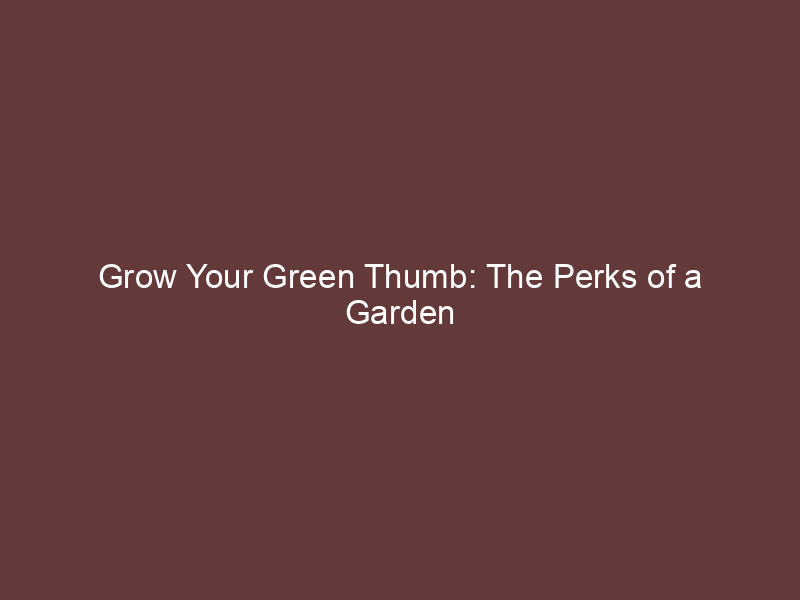
Introduction to Garden Journaling
Are you a gardening enthusiast? Or perhaps you’re just starting out on your green-thumbed journey? Either way, you’ve probably heard about garden journaling. But what exactly is it, and why should you consider keeping a garden journal? Let’s dive in and find out!
- What is a Garden Journal?
- Why Keep a Garden Journal?
A garden journal is a handy tool for any gardener, whether you’re a seasoned pro or a budding beginner. It’s essentially a diary where you record everything about your garden. This could include what plants you’re growing, when you planted them, how they’re progressing, and any challenges you’ve faced along the way. It’s a place to jot down your thoughts, observations, and ideas about your garden. Think of it as a personal history of your garden’s life, filled with your gardening experiences and lessons learned.
Keeping a garden journal has many benefits. Firstly, it helps you keep track of what’s happening in your garden. You can note down when you planted seeds, when they sprouted, and when you harvested them. This information can be incredibly useful for planning future gardens. Secondly, a garden journal can help you identify patterns and trends. For example, you might notice that certain plants do better in certain areas of your garden, or that pests tend to appear at certain times of the year. Lastly, a garden journal is a wonderful way to reflect on your gardening journey and see how far you’ve come. It can be a source of pride and joy, a testament to your hard work and dedication.
Importance of Garden Journal
Keeping a garden journal is an essential part of gardening that is often overlooked. It’s not just about recording what you plant and when, but it’s also about understanding your garden’s unique needs and characteristics. A garden journal can be a powerful tool in helping you become a better gardener, plan and organize your garden more effectively, and keep a record of your gardening journey.
Benefits of Gardening Journal
There are numerous benefits to keeping a garden journal. Here are some of the most significant ones:
- Improves Gardening Skills
- Helps in Planning and Organizing
- Acts as a Record Keeper
Keeping a garden journal can significantly improve your gardening skills. By recording what works and what doesn’t, you can learn from your mistakes and successes. For example, if a certain plant thrives in your garden, you can note the conditions and replicate them in the future. This continuous learning process can make you a more skilled and knowledgeable gardener.
A garden journal can be a great help in planning and organizing your garden. You can keep track of when you planted seeds, when you fertilized, and when you harvested. This can help you plan for the next season and ensure that you’re taking the right steps at the right time. It can also help you organize your garden layout, keeping track of where you’ve planted certain crops or flowers.
Finally, a garden journal acts as a record keeper. It’s a place where you can record your garden’s progress over time, noting changes in the plants, soil, and overall garden health. This can be particularly useful if you’re trying to improve your garden’s productivity or if you want to look back and see how far you’ve come. It’s also a great way to record and remember the joy and satisfaction that gardening brings.
In conclusion, a garden journal is more than just a notebook. It’s a tool that can help you become a better gardener, plan and organize your garden effectively, and keep a record of your gardening journey. So why not start one today?
Advantages of Garden Journaling
Keeping a garden journal offers numerous benefits to both novice and experienced gardeners. It serves as a valuable tool for planning, organizing, and improving your garden over time. Let’s delve into some of the key advantages of garden journaling.
Garden Record Keeping
One of the primary benefits of a garden journal is the ability to keep detailed records of your garden. This includes:
- Tracking Plant Growth
- Documenting Weather Patterns
- Recording Pest and Disease Issues
By keeping a journal, you can record the growth of your plants from the time you plant the seeds until they reach maturity. This can help you understand how different plants grow under various conditions, enabling you to make necessary adjustments to improve their growth in the future.
Weather plays a crucial role in the health and productivity of your garden. A garden journal allows you to document weather patterns and their effects on your plants. Over time, you can use this data to predict how future weather conditions might impact your garden.
Every garden faces challenges from pests and diseases. With a garden journal, you can keep track of what issues you’ve encountered, when they occurred, and how you addressed them. This information can prove invaluable in preventing and managing future outbreaks.
In conclusion, a garden journal is a powerful tool that can enhance your gardening experience. It allows you to track your garden’s progress, learn from past mistakes, and make informed decisions for future planting seasons. So why not start your garden journal today?
Keeping a Garden Diary: A Step-by-Step Guide
Keeping a garden diary can be a fun and rewarding experience. It allows you to track your garden’s progress, learn from your successes and failures, and create a beautiful record of your gardening journey. Here’s a simple step-by-step guide to help you start your own garden journal.
Starting Your Garden Journal
Starting a garden journal is easier than you might think. All you need is a notebook, a pen, and a love for your garden. Here are the main steps to get you started:
- Choosing Your Journal
- What to Include in Your Journal
- How to Maintain Your Journal
First, you’ll need to choose a journal. This could be a simple notebook, a fancy diary, or even a digital app. The most important thing is that it’s something you’ll enjoy using and that you’ll be able to keep up with regularly.
Next, decide what you want to include in your journal. This could be anything from a list of the plants you’re growing, to notes on the weather, to photos of your garden. You might also want to include details about your gardening techniques, any pests or diseases you’ve encountered, and your plans for future gardening projects.
Maintaining your journal is all about consistency. Try to make a habit of writing in it regularly, whether that’s every day, every week, or every month. Remember, the more details you include, the more useful your journal will be in the future. Don’t forget to date each entry so you can look back and see how your garden has changed over time.
Keeping a garden diary is a wonderful way to deepen your connection with your garden and improve your gardening skills. So why not give it a try? You might be surprised at how much you enjoy it.
Garden Journaling Tips
Keeping a garden journal can be a rewarding experience. It allows you to track your progress, learn from your mistakes, and plan for the future. Here are some tips to help you make the most of your garden journaling experience.
- Be Consistent
- Include Photos
- Don’t Forget to Include Failures
Consistency is key when it comes to garden journaling. Try to make a habit of writing in your journal at least once a week. This will help you keep track of what’s happening in your garden and notice patterns over time. For example, you might start to see that certain plants do better in certain areas of your garden, or that pests tend to appear at certain times of the year.
Photos can be a great addition to your garden journal. They provide a visual record of your garden’s progress, and can help you remember details that you might otherwise forget. Try to take photos from the same angles each time, so you can easily compare changes over time. You can also use photos to document problems, like disease or pest damage, so you can research solutions and prevent the same issues in the future.
It’s natural to want to focus on your successes, but it’s just as important to record your failures. Every gardener makes mistakes, and those mistakes are opportunities to learn and improve. By documenting what didn’t work, you can avoid making the same mistakes in the future. Plus, you might find that what seemed like a failure at the time was actually a valuable lesson in disguise.
Remember, the most important thing is to make your garden journal work for you. It’s a tool to help you become a better gardener, so don’t be afraid to adapt these tips to fit your needs.
Garden Journaling Ideas
Keeping a garden journal can be a fun and rewarding activity. It allows you to record your gardening journey, track your progress, and learn from your experiences. Here are some creative ideas to inspire your garden journaling.
Inspiration for Your Garden Journal
Every garden is unique, and so should be your garden journal. Let’s explore some ideas that can make your journal a true reflection of your garden and your gardening journey.
- Sketches and Drawings
- Plant Wish Lists
- Garden Layouts
Even if you’re not an artist, sketches and drawings can add a personal touch to your garden journal. They can be simple doodles of your plants, detailed illustrations of your garden layout, or even abstract representations of your gardening experiences. Drawing can help you see your garden in a new light and appreciate its beauty in a different way.
Every gardener has a list of plants they’d love to grow. Why not include this in your garden journal? You can jot down the names of the plants, their growing conditions, and where you can buy them. This can serve as a reminder and a guide when you’re ready to expand your garden.
Recording your garden layout in your journal can be incredibly useful. It can help you plan your planting, track your garden’s growth, and identify areas that need improvement. You can draw a simple map of your garden, marking the locations of your plants and noting their growth over time. This can give you a clear picture of your garden’s progress and help you make informed decisions about future planting.
Remember, your garden journal is a personal space for you to express your thoughts, ideas, and experiences. There’s no right or wrong way to do it. The most important thing is to enjoy the process and learn from it. Happy journaling!
Case Study: The Impact of a Garden Journal
Let’s delve into two compelling case studies that highlight the significant impact a garden journal can have on your gardening experience. These real-life examples will demonstrate how garden journaling can enhance productivity and help solve pest problems.
-
Case Study 1: Improving Garden Productivity
Meet Jane, a passionate home gardener from Oregon. She started keeping a garden journal two years ago. Before that, she struggled with remembering when she last watered her plants, fertilized the soil, or pruned the bushes. The result was a garden that was not as productive as she wanted it to be.
Once she began journaling, Jane noted down every detail about her garden activities – from the type of seeds she planted to the weather conditions. She also recorded her observations about the growth of her plants. Over time, she began to see patterns and understand what worked best for her garden.
The result? A 30% increase in her garden’s productivity in just one year. Her garden journal allowed her to make informed decisions about her garden care, leading to healthier, more productive plants.
-
Case Study 2: Solving Pest Problems
Next, we have John, a small-scale organic farmer from California. He was battling a persistent pest problem that was damaging his crops. Despite trying various pest control methods, he was unable to find a permanent solution.
John decided to start a garden journal where he documented every pest he encountered, the damage they caused, and the control methods he tried. He also noted down the times of the year when the pests were most prevalent.
Armed with this information, John was able to identify the most effective pest control methods for each pest and the best time to apply them. Within six months, he significantly reduced the pest problem in his garden, leading to healthier crops and increased yield.
These case studies clearly illustrate the power of a garden journal. By keeping a detailed record of your garden activities, you can gain valuable insights that can help improve your garden’s productivity and solve persistent problems. So, why not start your garden journal today?
Conclusion: The Lasting Benefits of a Garden Journal
As we draw to a close on our discussion about garden journals, let’s take a moment to reflect on the key points and lasting benefits that come with keeping a garden journal.
- Recap of the Importance of Garden Journal
Throughout our discussion, we have underlined the importance of a garden journal as a tool for tracking, planning, and improving your gardening activities. It serves as a personal guide, helping you remember what you planted, when you planted it, and how it grew. It also allows you to note observations, ideas, and inspirations that can enhance your gardening experience.
Moreover, a garden journal can be a source of joy and satisfaction. It’s a place to record your successes, learn from your mistakes, and watch your garden – and your skills as a gardener – grow over time.
- Final Thoughts on Garden Journaling
In conclusion, garden journaling is more than just a hobby. It’s a practice that brings numerous benefits, both tangible and intangible. It can improve your garden’s productivity, enhance your gardening knowledge, and even contribute to your personal growth and well-being.
Whether you’re a seasoned gardener or a beginner, keeping a garden journal can transform your gardening journey. It’s a simple practice, but its impact can be profound. So why not start your garden journal today? Remember, every great garden started with a single seed – and every great garden journal started with a single entry.
Happy gardening, and happy journaling!






